CRM is like the magic wand for handling all your company’s chats with customers, both old and new. It’s all about using tech to keep things smooth, from sales to customer service. Contact management is a biggie here, making sure you keep track of every chat with leads and customers.
The sales pipeline is like a roadmap of the sales journey, from finding leads to sealing the deal. It gives a clear picture of your sales game plan and helps you keep leads moving through the stages, from just knowing about you to buying. Hitting those sales targets means keeping a close eye on the numbers in the pipeline. Lead nurturing is all about building relationships with potential buyers throughout the sales cycle.
Introduction to CRM and sales pipeline management
CRM is a smart way to handle all the back-and-forth with potential and current customers. It’s about using tech to keep things organized, automated, and in sync, especially in sales but also in marketing and customer service. A good CRM strategy boosts your sales numbers, smooths out operations, and helps you find new leads.
The sales pipeline, on the flip side, is a visual guide of the sales process, from the first lead to closing the deal. It helps you see the sales cycle, manage leads, and quickly get a grip on where customers are in the sales funnel. This helps you hit your sales targets, with lead nurturing being key to moving prospects through the pipeline.
Defining CRM
CRM, or Customer Relationship Management, is like your company’s secret weapon for keeping tabs on all your customer interactions. It’s all about using customer data to boost business relationships, focusing on keeping customers happy and driving sales growth.
The goal? Manage leads, streamline the sales process, and keep an eye on the sales pipeline.
A CRM system is your go-to for contact management, lead generation, and lead nurturing throughout the sales cycle. It helps you hit your sales targets by providing valuable sales metrics and shaping your sales strategy. In a nutshell, CRM is crucial for successful sales operations.
Role of CRM in business
CRM is the backbone of a solid sales strategy for any business. It’s all about contact management, lead generation, and lead nurturing—key steps in the sales process. A well-thought-out CRM strategy smooths out the sales cycle, helps you exceed sales targets, and simplifies sales operations.
With CRM, you can manage leads more effectively, boosting the efficiency of your sales funnel and pipeline. Plus, it provides clear sales metrics to review performance and insights into customer data, making the whole CRM process stronger.
Key features of CRM
CRM’s have some killer features like contact management, sales pipeline, and lead management capabilities. Contact management lets you keep track of customer data, document interactions, and handle the sales process more efficiently. With a CRM, you can visualize the sales funnel and monitor the sales cycle in real-time, making it a powerful tool for hitting sales targets.
The sales pipeline feature makes it a breeze to follow up on key sales metrics. It helps you track opportunities from lead generation through nurturing to conversion.
A solid CRM strategy enhances the lead nurturing process, automating follow-ups, reminders, and updates to ensure no potentially profitable lead slips through the cracks.
Utilizing Bonsai CRM to streamline project management
If you're looking for a comprehensive solution to manage both client relationships and projects, Bonsai CRM offers a compelling option. Bonsai CRM offers a powerful set of features designed to streamline project management alongside its client relationship management (CRM) functionalities. It's awesome tool that helps you keep your project neat and tidy from start to finish. It’s like having a magic wand that organizes everything from what needs to be done to how much you’re spending.
Here are some of the standout features that Bonsai CRM offers:
Client management
Bonsai CRM allows users to add leads, existing clients, and internal notes to keep track of all contacts in one place. This centralized database makes it easy to manage relationships and follow up on potential deals. Bonsai centralizes client information, proposals, contracts, and communication, fostering stronger relationships. Imagine never losing track of a lead or scrambling to find a crucial email. Bonsai keeps everything organized, allowing you to focus on building trust and exceeding client expectations.

Project organization
Users can fill their projects with all necessary documents, payments, tasks, and timesheets. This feature ensures that everything related to a project is organized and easily accessible. Manage projects with ease using Bonsai's built-in tools. Assign tasks, track time, and ensure deadlines are met – all within a single platform. This transparency keeps your team on the same page and projects running smoothly, leading to happier clients and repeat business.
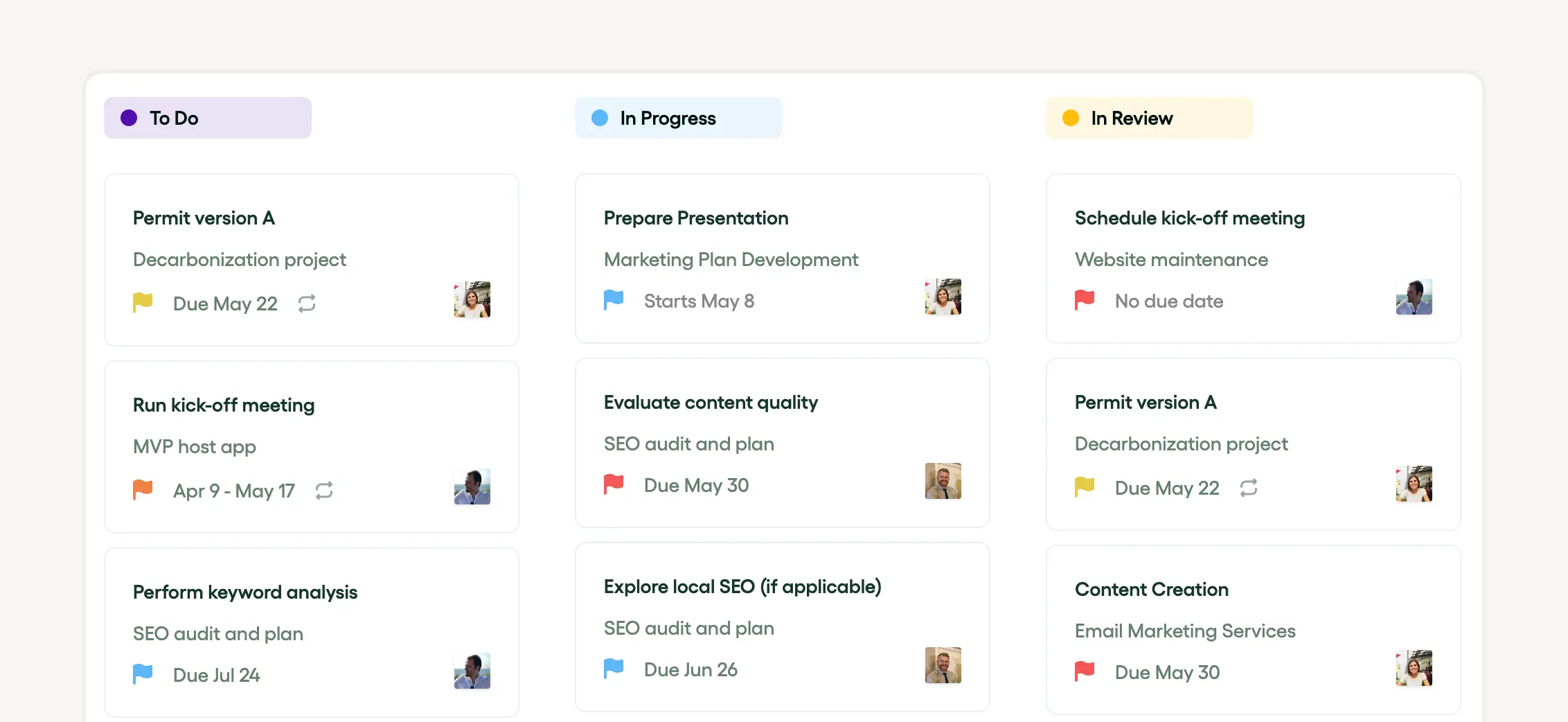
Workflow automations
The CRM automates client workflows, saving time and ensuring no step is missed. From sending automated reminders to clients to following up on unpaid invoices, Bonsai handles it all. It logs all the crucial details and handles routine tasks like a champ—think welcome emails, intake forms, regular follow-ups. This saves you time and ensures every client gets the royal treatment.
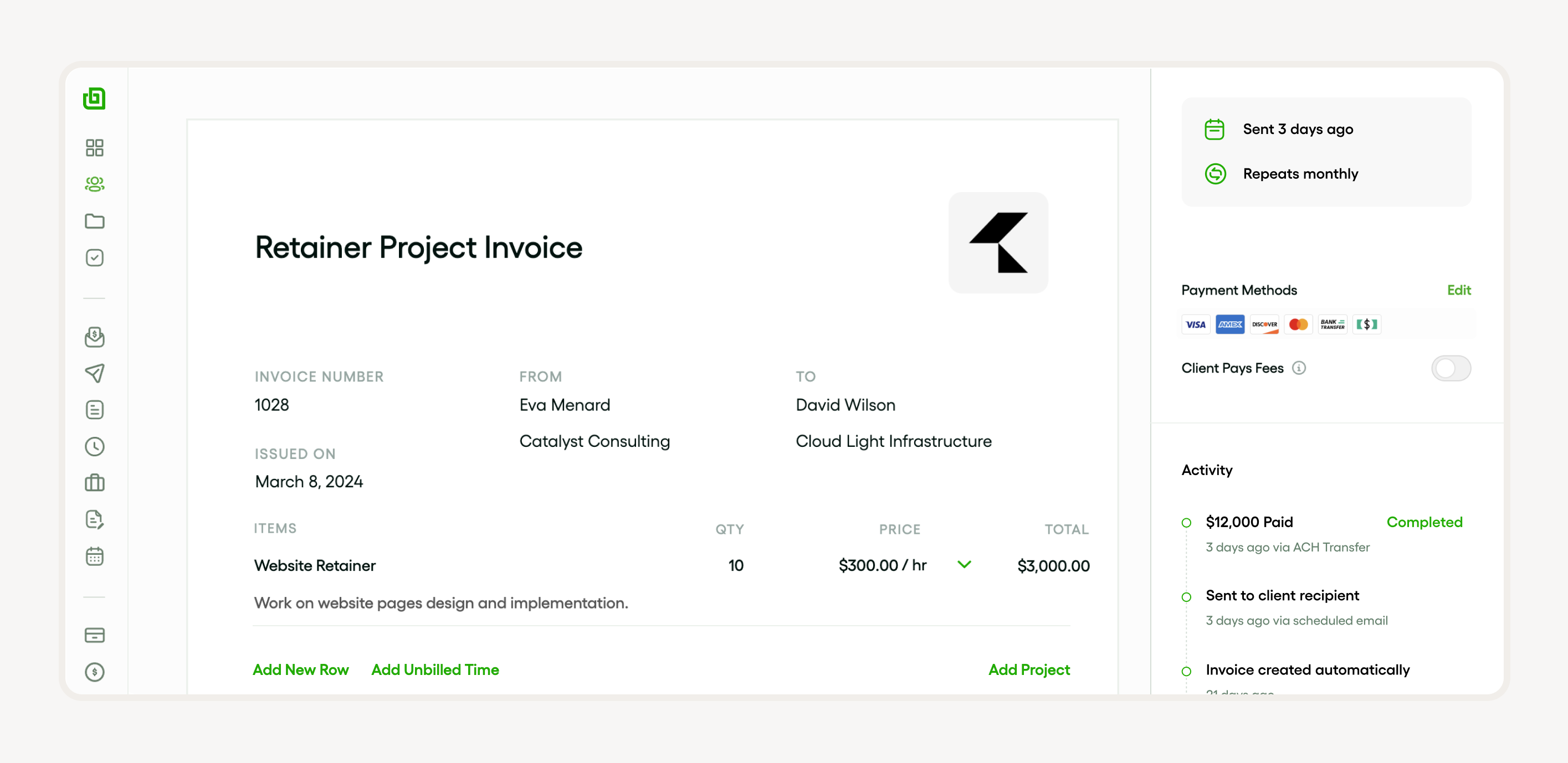
It’s got some really handy features like task management that lets you keep an eye on how things are moving and make changes on the fly. Plus, it’s great for making sure everyone is working together nicely, and it even takes care of the boring stuff so you can focus on the big picture.
Understanding sales pipeline management
In managing sales, it's important to have a strong grasp on CRM, but equally critical to understand the aspects of pipeline management. This process involves tracking and organizing prospects through different stages of the sales process. Adopting efficient pipeline management strategies can accelerate your sales cycle and improve your overall performance.
In our previous article, we discussed the steps involved in constructing a pipeline for your sales team. If you want to take your sales to the next level, you must consider integrating your sales pipeline stages with a robust CRM system. This not only ensures organized data management but also assists in streamlined pipeline management.
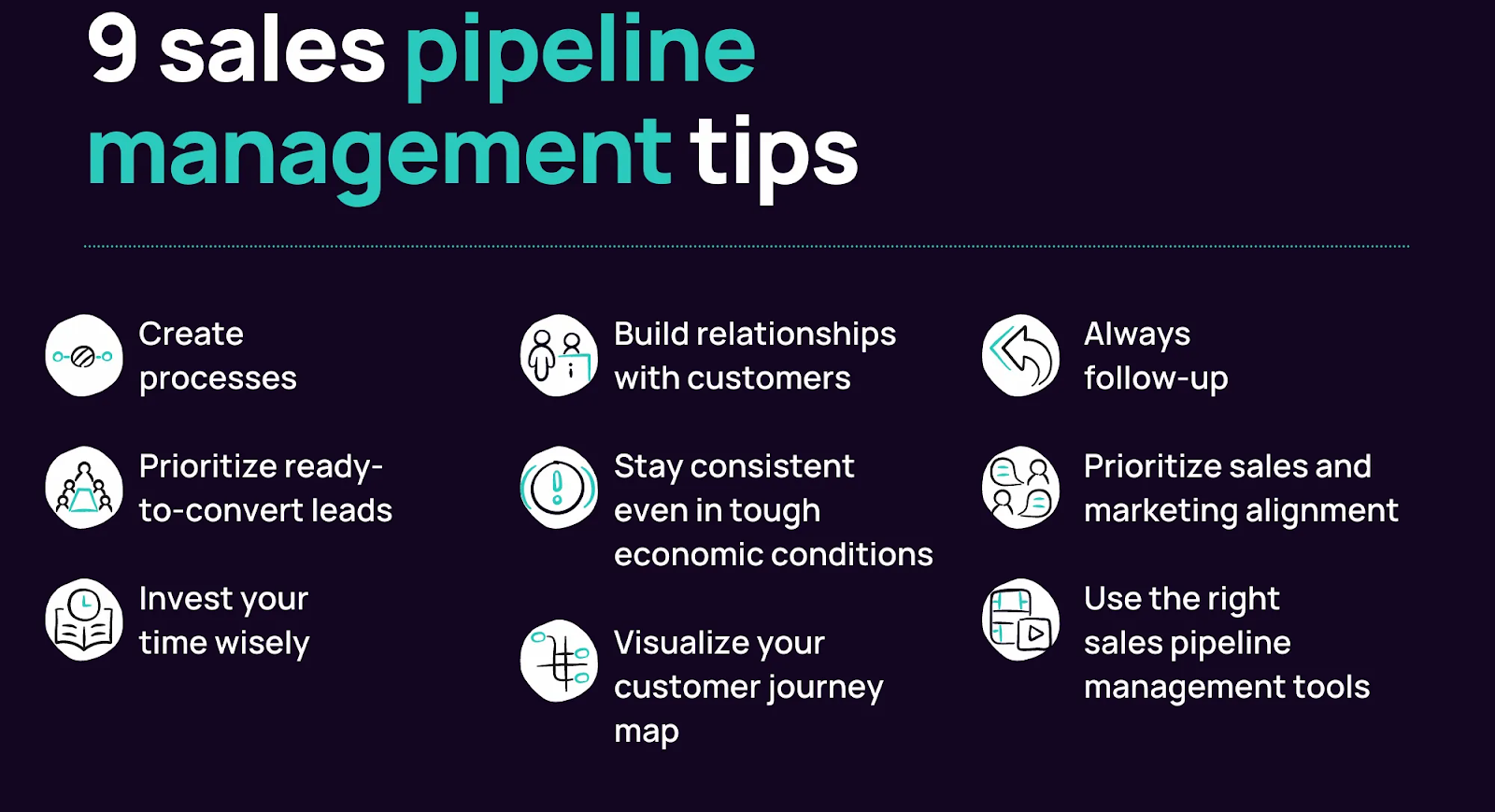
Sales pipeline management is like the backbone of the sales game. It helps companies keep tabs on leads and track customer info smoothly. It keeps the sales train chugging along the tracks. Plus, it makes sure there are enough deals in the works to hit those sales targets.
So, good pipeline management means using tricks like lead generation, lead nurturing, and a solid CRM strategy. By mixing in contact management, sales funnels, and sales metrics, businesses can boost their customer relationships big time.
Importance of sales pipeline management
Sales pipeline management is a big deal in the sales world. It maps out the sales journey, making lead generation and nurturing a breeze. With spot-on pipeline management, hitting sales targets becomes crystal clear. It’s a key piece of the CRM puzzle, directly impacting sales moves.
By handling leads through the sales funnel, companies can fine-tune their sales metrics and craft a killer sales strategy. Plus, pipeline management helps with smooth contact management, letting teams use customer data better and beef up customer relationships.
Stages in sales pipeline management
The sales pipeline journey kicks off with lead generation, a must in the sales cycle. Qualified leads then move to the next stage, which is all about lead nurturing. This means keeping in touch with leads, often with a CRM strategy, to nudge them closer to buying.
Sales targets are the goals the sales crew aims for. Keeping an eye on sales activities with sales metrics helps streamline the process. Good contact management and using customer data smartly can give better insights into customer relationship strategies, making the sales funnel even better.
Interplay between CRM and sales pipeline management
CRM and pipeline management are vital for maintaining customer relationships and driving sales. However, to further optimize your sales process, consider incorporating strategies from marketing automation for agencies. This seamless blending of tactics can significantly enhance your agency's overall efficiency and productivity.
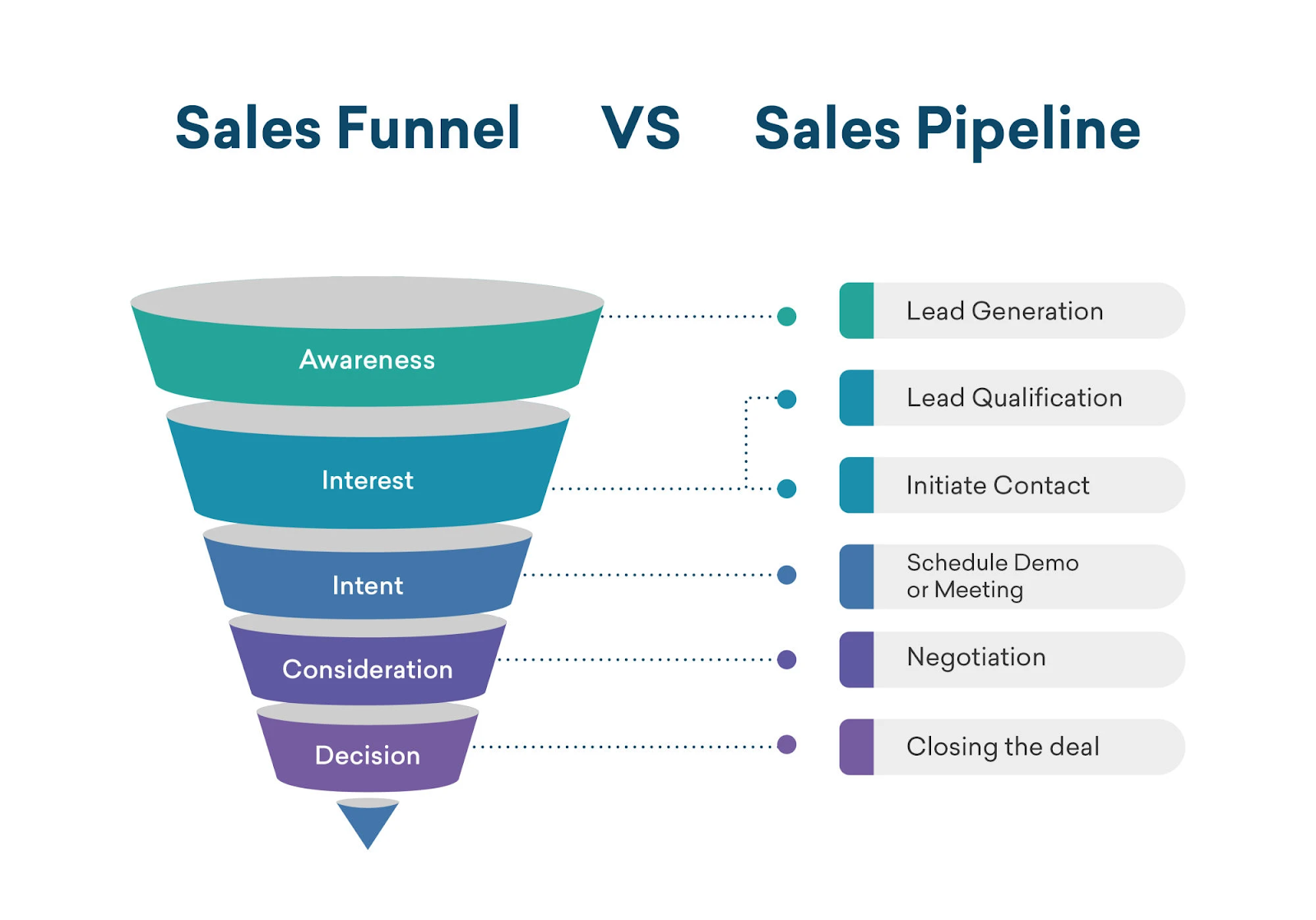
CRM is the secret of many business coaches when talking about sales pipeline management. The sales game leans on contact management and CRM systems to steer leads through the funnel. Lead generation and nurturing activities push potential clients through the sales cycle.
CRM systems supercharge sales operations with valuable customer data. These insights help monitor sales metrics, streamline strategies, and hit sales quotas. The dance between CRM and sales pipeline management is key for effective sales.
How CRM supports sales pipeline management
A CRM strategy backs sales pipeline management with slick contact management tools, letting businesses track and guide leads through the funnel. The CRM system neatly organizes customer data, aiding in lead generation and nurturing, and keeps a close eye on the sales cycle.
This fine-tunes the sales process and offers deep insights into sales metrics. CRM smooths sales operations by giving a clear view of the pipeline, helping the sales team hit their quotas. The heart of CRM is a centralized system that seamlessly manages the sales strategy.
Benefits of integrating CRM and sales pipeline management
Merging CRM with sales pipeline management brings big perks. It streamlines the sales process, boosting lead generation and nurturing. Better contact management keeps customer data tidy and handy, supporting a stronger CRM strategy and smoother operations.
Another plus is better tracking of sales metrics. Integration gives real-time updates on the funnel and cycle, helping hit sales quotas. Overall, an integrated system means efficient resource use and better customer relationship management.
Top CRM software for sales pipeline management
Top-notch CRM software is crucial for solid sales pipeline management, offering tools for lead generation, nurturing, and contact management. Big names like Salesforce, Zoho CRM, and HubSpot provide real-time insights into the funnel to manage leads and meet quotas. They help craft sales strategies using sales metrics and customer data, boosting the sales cycle and strategy, and strengthening CRM.
Bonsai CRM
Bonsai CRM is like the Swiss Army knife for sales pipeline management, perfect for both big agencies and individual pros. It grabs every stage from lead gen to deal closing and puts it in one place, so you don’t let any opportunities slip or relationships go stale.
It’s like having X-ray vision for your sales journey, from the first hello to the final handshake, helping bosses zero in on the juiciest opportunities. The tool makes sure your resources are spent wisely, fine-tuning those sales chats and cranking up the analysis to boost your sales game.
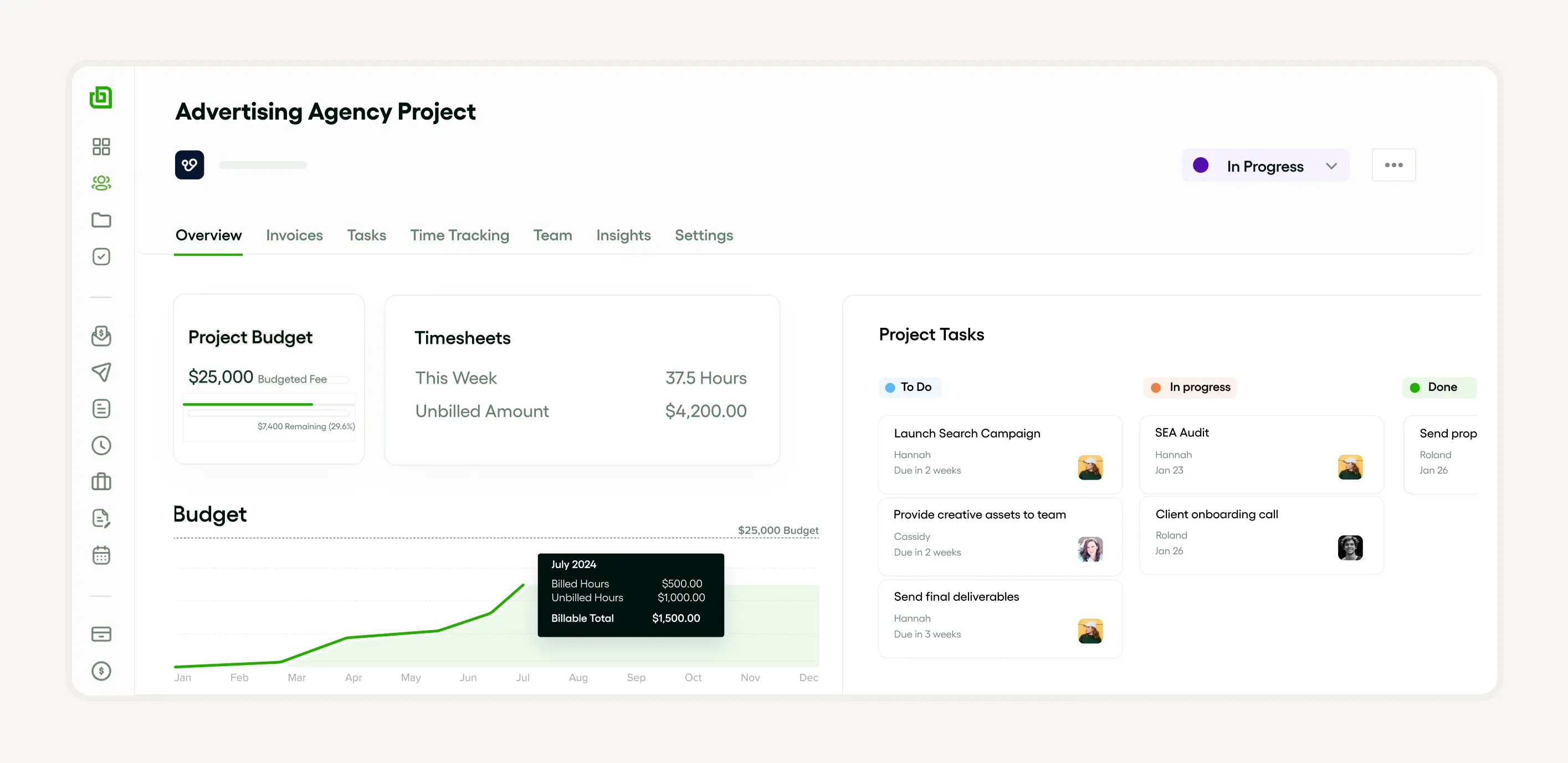
Forecasting sales with Bonsai CRM feels like having a crystal ball, helping you make smart calls and keep your pipeline slick and efficient. It’s a whiz at predicting sales, tracking what your team's up to, and smashing those targets, all feeding into a sharp sales strategy.
Bonsai isn’t just about sales; it weaves in project and task management plus workflow automation to level up your team’s productivity and keep everyone on the same page.

In short, Bonsai CRM is your go-to for making your sales pipeline management a breeze. It’s packed with strategic views, automation tools, and regular progress check-ins, making it a gem for teams aiming high.
Whether you’re gunning for better forecast accuracy or a turbocharged team performance, Bonsai CRM packs the right punch with killer features and deep insights for mastering pipeline management.
Hubspot CRM
HubSpot CRM is the smooth operator of the CRM world, turning your sales operations creamy and dreamy. It’s all about generating leads and nurturing them, setting up a system to keep tabs on customer info and keep the conversation flowing.
This powerhouse gives you a panoramic view of your sales pipeline, making it easy to spot and hit your sales goals. With HubSpot’s clever strategies, businesses can track their sales performance like a pro and build rock-solid customer relations. The support and ease you get with HubSpot CRM? Simply top-tier.
Salesforce CRM
Salesforce CRM is the big kahuna, helping companies streamline their sales ops and get a firm grip on their CRM strategies. Loaded with goodies for contact management, lead gen, and nurturing, it keeps your sales pipeline healthy and vibrant.
With Salesforce, you can: Manage leads from first contact to final conversion. Dive deep into sales metrics and fine-tune your sales tactics. Enhance customer relationships by customizing interactions based on collected data and behaviors.
Zoho CRM
Zoho CRM does the heavy lifting in customer relationship management, making your sales process as smooth as silk, from lead generation to nurturing. It’s armed with a savvy CRM strategy that helps manage leads and monitor the sales cycle like a boss.
With top-notch features like contact management, it sharpens your sales operations, organizing customer info, and refining your sales approach. Zoho CRM offers a crystal-clear view of your sales pipeline and funnel, helping teams hit their targets quicker and smarter. Its robust sales metrics tool lets you measure and boost your sales process efficiency.
Pipedrive CRM
Pipedrive CRM is the sleek navigator of the CRM seas, enhancing your sales operations and beefing up your CRM strategy. It’s all about contact management, lead generation, and nurturing, streamlining your sales process to consistently nail those sales goals.
Pipedrive’s standout features include a visually intuitive sales pipeline for eyeing your sales cycle, a systematic approach to managing leads, and an insights section for dissecting vital sales metrics. Crafted with a sales-centric mindset, it leverages customer data to support a victorious sales strategy and ensures your sales funnel is running at full tilt.
Choosing the right CRM for sales pipeline management
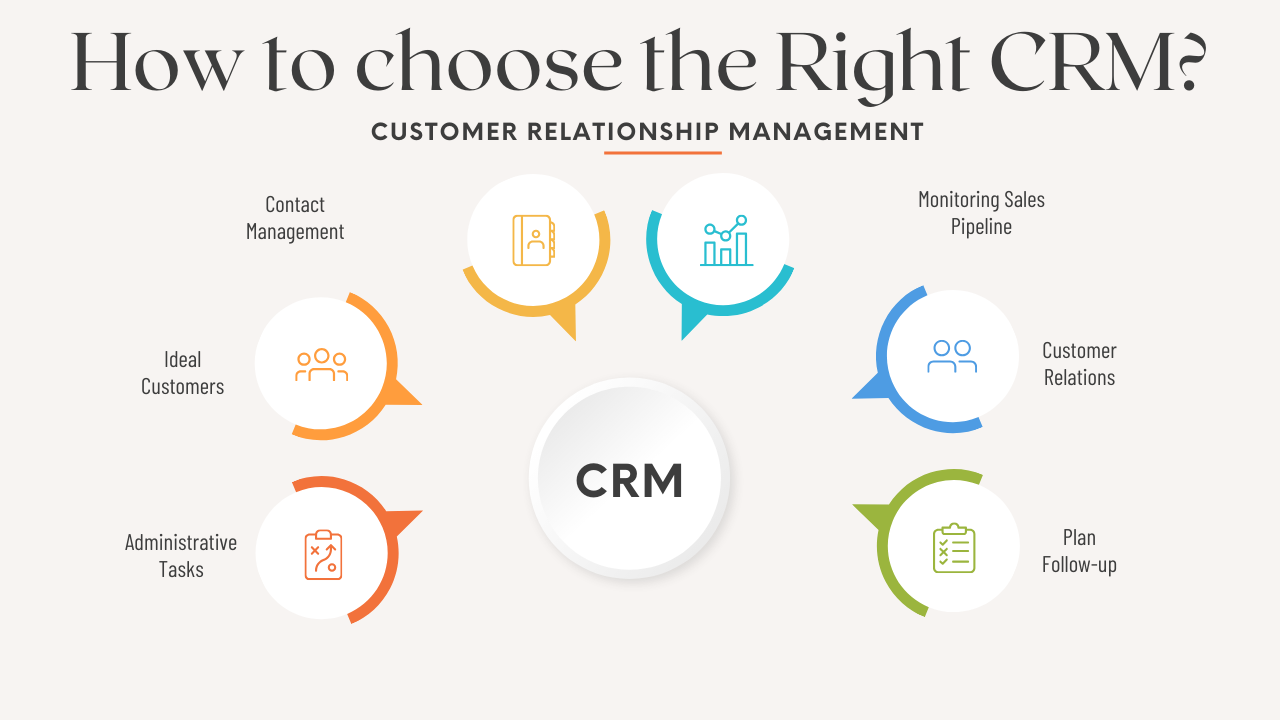
A quick shout out to everyone trying to lock down the perfect CRM for their sales ops: it's like picking the right tool for the job, tailor-made for your sales dance. Think about how it juggles your leads, helps you crush those sales targets, and keeps your contacts as tidy as a pin.
A CRM strategy is your ace in the hole, managing leads and keeping your sales funnel as neat as a new pin. You gotta think about how it throws useful sales stats at you, keeps your customer info snug, and fits into your big sales game plan like a glove.
Understanding your business needs
Diving deep into what your biz needs is key to nailing that sales strategy. Break down your sales cycle and process to spot where you can crank things up a notch. Those sales metrics? Gold for measuring how you stack up against your targets.
Boosting your CRM game means getting better at herding your leads, giving them the TLC they need, and keeping your contacts on point. A slick sales pipeline lets you see your sales funnel clearer than ever and guess where things are heading.
And don’t forget, weaving customer data into your sales moves helps you get a grip on customer habits and tweak your sales tactics to perfection.
Evaluating CRM features and capabilities
When you're sizing up a CRM, think about how it's gonna streamline your sales moves and make your sales cycle shorter. Look for killer contact management features that are all about powering up your lead game and nurturing them right.
Your CRM should let you handle leads in the sales pipeline like a pro and throw insightful sales metrics your way. It’s about hitting those sales targets and beefing up your sales strategy with top-notch customer data that spices up your customer relations.
putting CRM to work for sales pipeline management
Rolling out a CRM strategy is crucial for keeping your sales pipeline running smooth. It’s all about making your sales process slick, managing leads with more zap, and making sure every lead gets the attention it needs.
A tight CRM setup means your data’s organized, your sales operations are smoother, and tracking and hitting your sales goals gets a whole lot easier. CRM’s a game-changer for lead generation, simplifying your sales funnel, and amping up customer relationship management.
Implementing CRM for sales pipeline management
Rolling out a CRM strategy is crucial for keeping your sales pipeline running smooth. It’s all about making your sales process slick, managing leads with more zap, and making sure every lead gets the attention it needs.
A tight CRM setup means your data’s organized, your sales operations are smoother, and tracking and hitting your sales goals gets a whole lot easier. CRM’s a game-changer for lead generation, simplifying your sales funnel, and amping up customer relationship management.
Steps in CRM implementation
Kickoff your CRM journey by sketching out a strategy.
- Get to know your sales process, cycle, and targets inside out to pinpoint what data you gotta keep an eye on. This could be anything from customer info to sales stats that clue you in on how your sales are doing.
- Next up, focus on managing your contacts, generating leads, and nurturing them. Keep those leads moving smoothly through your sales pipeline and sales funnel.
- And don’t forget to check how your CRM is doing by keeping an eye on key sales metrics. This helps make sure your CRM strategy is on point, enhancing your customer relations and boosting your sales process.
- Next in line is managing your contacts, generating leads, and nurturing them. Keep those leads moving smoothly through your sales pipeline and sales funnel.
- And finally, always check how your CRM is doing by keeping an eye on key sales metrics. This helps make sure your CRM strategy is on point, enhancing your customer relations and boosting your sales process.
Training and support for CRM use
Getting your CRM strategy off the ground means training and supporting your team across various sales tasks like lead generation, the sales process, and contact management. Solid training helps your team manage leads like pros, move them through the sales funnel, and wrap up sales cycles within your target quotas.
Ongoing support is crucial too, helping your team get the hang of sales metrics, fine-tune the sales pipeline, and make the most of customer data. This not only beefs up your customer relationships but also takes your overall sales strategy to the next level.
Measuring the success of CRM and sales pipeline management
Measuring how well your CRM strategy or sales pipeline management is working means keeping an eye on a bunch of sales metrics. These could cover lead generation, lead nurturing, and hitting sales quotas on time. A good CRM strategy should make your sales cycles shorter and your sales processes smoother.
Keeping tabs on customer data is key to nailing your sales operations. It helps with contact management, better lead nurturing, and optimizing the sales funnel. Signs of a successful CRM? More lead conversions, hitting sales quotas, and navigating the sales pipeline like a pro.
Key performance indicators (KPIs)
KPIs are like the heartbeat of your sales strategy. They’re the metrics that show how well your sales process is working. For example, the length of the sales cycle can be a big KPI, showing how fast you’re turning prospects into customers.
Other important KPIs include the sales quota, which measures the sales volume you’re aiming for, and the efficiency of lead nurturing, showing how well your CRM strategy is working. CRM tools give you valuable customer data, insights into the sales pipeline, and help with contact management.
Sales metrics are crucial for spotting where you can improve. From lead generation tactics to how well you manage leads through the sales funnel, these metrics offer big opportunities for growth.
Improving CRM and sales pipeline management practices
Streamlining your CRM strategies can seriously boost your sales operations and lead nurturing practices. Having a solid contact management process means potential customer data is well-organized and easy to access, making the sales process smoother. It also helps manage leads efficiently by tracking their progress in the sales funnel.
To hit your sales metrics and reach your sales quota, you need to constantly monitor and manage the sales pipeline. Regularly review and adjust the sales cycle based on market trends and customer behavior patterns, aligning with your overall sales strategy. Improving CRM practices is key to boosting sales productivity and revenue.
Conclusion: The future of CRM and sales pipeline management
The future of CRM and sales pipeline management is set for amazing innovation with advanced strategies ready to shake up the sales process. With more reliance on customer data, new technologies are being developed to enhance lead generation and nurturing, shortening the sales cycle and helping businesses hit their sales quotas more efficiently.
New CRM strategies will improve contact management, manage leads more effectively, and optimize the sales funnel with greater precision. Moving forward, CRM will become a core part of sales operations, ushering in an era of data-driven sales metrics and strategy.








